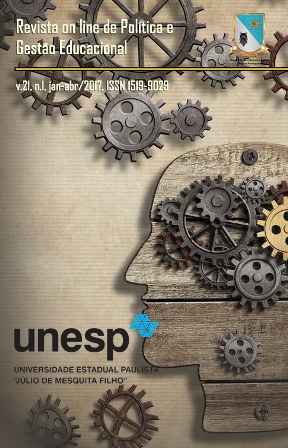PEDAGOGUE'S WORK IN THE SOCIAL ENTITIES: ANALYSIS OF PEDAGOGICAL ACTIONS INTEGRATED WITH PUBLIC POLICIES FOR SOCIAL ASSISTANCE
DOI:
https://doi.org/10.22633/rpge.v21.n1.2017.9453Keywords:
Social service. Pedagogy and education. Training and role of the teacher. Social assistance.Abstract
We present here the possibilities about the role of the educator in social organizations, integrating the guidelines and intentions of public policies of social assistance. In this way aims to raise possible reflections about social assistance in Brazil, to the formation of the pedagogue, their functions in the field of social work, as well as its contribution to the achievement of public policy goals of social assistance. Will be addressed such concepts from literature search where the indicators of hypotheses were raised of empirical way to elucidate concepts, hypotheses and the evidence of the issues initially raised. Through this research some challenges were appointed, clarifying that the teacher's work in the social entities, namely, social pedagogy is intrinsically linked to the concepts of social education, non-formal education and the integral education of individuals; the amplitude of these concepts with the devaluation of the professional educator who works in the social field enhances the importance of not cease our search for clarity and recognition of social pedagogue.
Downloads
References
BALEEIRO, Alionar; SOBRINHO, Barbosa. Constituições Brasileiras1946. 3ª Edição. Brasília. Subsecretaria de Edições Ténicas. 2012.
BEHRING, Elaine Rossetti. BOSCHETTI, Ivanete. Política Social: fundamentos e história. 9ª edição. São Paulo: Editora Cortez, 2011.
BOING, Angela; SILVA, Maria Boenno. A educação e o pedagogo para além dosespaços escolares. Disponível em: <http://www.educardpaschoal.org.br/web/fundacao-artigos-ver.asp?aid=100?>. Acesso em: 17 dez. 2015.
BRASIL (a), Código Civil (1946). Constituição Federal. Disponível em: <http://www.planalto.gov.br/ccivil_03/Constituicao/Constituicao46.htm>. Acesso em: 17 dez. 2015.
BRASIL (b), Código Civil (1988). Constituição Federal. Disponível em: <http://www.planalto.gov.br/ccivil_03/constituicao/ConstituicaoCompilado.htm> Acesso em: 17 dez. 2015.
BRASIL (c), Código Civil (1993). Lei Orgânica de Assistência Social. Disponível em: <http://www.planalto.gov.br/ccivil_03/leis/l8742.htm>. Acesso em: 17 dez. 2015.
BRASIL (d), Ministério do Desenvolvimento e Combate a Fome. (2005) Plano Nacional de Assistência Social – PNAS. Disponível em: <http://www.mds.gov.br/assistenciasocial/arquivo/Politica%20Nacional%20de%20Assistencia%20Social%202013%20PNAS%202004%20e%202013%20NOBSUAS-sem%20marca.pdf>. Aceso em: 17 dez. de 2015.
BRASIL (e), Ministério daEducação (2005). Diretrizes Curriculares Nacionais para o Curso de Pedagogia. Disponível em: <http://portal.mec.gov.br/cne/arquivos/pdf/pcp05_05.pdf>. Acesso em: 17 dez. 2015
CARIDE, José Antônio. Las fronteras de la pedagogia social. Perspectivas científica e histórica. Barcelona: Gedisa, 2005. 285p.
CERONI, Mary Rosane. O Perfil do Pedagogo para atuação em Espaços NãoEscolares. Disponível em: <http://www.proceedings.scielo.br/scielo.php?pid=MSC0000000092006000100040&script=sci_arttext>. Acesso em 17 dez. 2015.
CRUZ, José Anderson Santos.; BIZELLI, José Luís. Docência para o ensino superior: inovação, informação e construção do conhecimento na era digital. Cad. Ed. Tec. Soc., Inhumas, v. 8, n.1, p. 79-90, 2015. Disponível em: < http://cadernosets.inhumas.ifg.edu.br/index.php/cadernosets/article/view/227/130>. Acesso em: 17 dez. 2015.
DEMO, Pedro. Política Social, Educação e Cidadania. Campinas, SP: Papirus, 1994.
FREIRE, Paulo. Pedagogia da Autonomia. Saberes Necessários à Prática educativa. 25ª Edição. São Paulo: Paz e Terra, 1996. 54p.
FREIRE, Paulo. Pedagogia da Indignação. Cartas Pedagógicas e outros escritos. 1ª Edição. São Paulo: Paz e Terra, 2014.155p.
GENEROSO, Claudiney. O Serviço Social como gestor de projetos sociais e o trabalho emequipe. Valinhos: Anhanguera Educacional, 2014. Disponível em: <http://anhanguera.com>. Acesso em : 17 de dez. 2015.
GOHN, Maria da Glória. Educação não formal e o educador social: atuação no desenvolvimento de projetos sociais. São Paulo: Cortez, 2010.
LIBÂNEO, José Carlos. Pedagogia e pedagogos, para quê? 8ª ed. São Paulo: Cortez, 2005.
MACHADO, Evelcy Monteiro. Pedagogia Social no Brasil: Políticas, teorias, e práticas em construção. Disponível em: http://www.pucpr.br/eventos/educere/educere2009/anais/pdf/PAL010.pdf. Acesso em: 17 dez. 2015.
PINTO, Roberto Perez. Terceiro Setor, Voluntariado e Responsabilidade Social. Valinhos: Anhanguera Educacional, 2014. Disponível em: <http://anhanguera.com> Acesso em: 17 de dezembro de 2015.
REZENDE, Maria José de. A Ditadura Militar no Brasil: repressão e pretensão de ligitimidade 1964-1984 [livro eletrônico]. 1º Livro Eletrônico. Londrina. Eduel 2013. Disponível em: < http://www.uel.br/editora/portal/pages/arquivos/ditadura%20militar.pdf>. Acesso em: 01 dez. 2015.
RIZOTTI, Maria. A construção do sistema de proteção social no Brasil: avanços e retrocessos na legislação social. Disponível em: <http://sisnet.aduaneiras.com.br/lex/doutrinas/arquivos/construcao.pdf>. Acesso em: 17 dez. 2015.
SANTIAGO, Emerson. República do Café com Leite. Disponível em: <http://www.infoescola.com/historia-do-brasil/revolucao-de-1930/>>. Acesso em: 17 de dez. 2015.
SERRÃO, Maria Isabel Batista. Aprender a Ensinar. São Paulo: Cortez, 2006.
SILVA, Fernando Guimarães Oliveira.Formação do pedagogo e as possibilidades de inserção profissional em espaços educativos não formais. Disponível em: http://meuartigo.brasilescola.com/educacao/formacao-pedagogo-as-possibilidades-insercao-profissional-.htm>. Acesso em: 17 dez. 2015.
TAVARES, Andrezza; SANTOS, Fábio. Educação Social, Pedagogia Social e Espaços Não – Escolares: Horizontes conceituais necessários para o acolhimento de sujeitos emrisco na perspectiva do desenvolvimento humano. Disponível em: <http://www.senept.cefetmg.br/galerias/Anais_2010/Artigos/GT8/EDUCACAO_SOCIAL.pdf>. Acesso em:17 dez. 2015.












